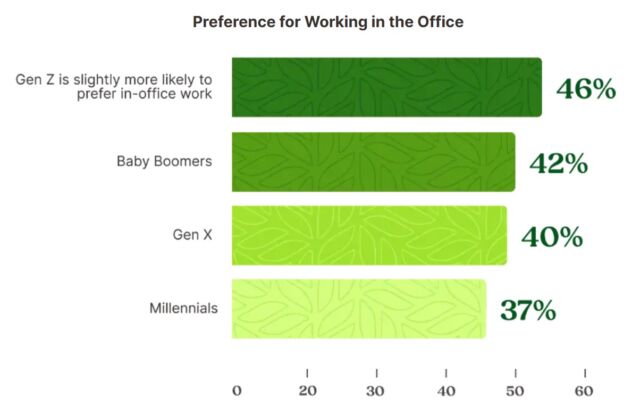
A brand new survey means that some US firms applied return-to-office (RTO) insurance policies within the hopes of getting employees to give up. And regardless of the assumption that such insurance policies might increase productiveness in comparison with letting workers make money working from home, the survey from HR software program supplier BambooHR factors to distant and in-office workers spending an equal period of time working.
BambooHR surveyed 1,504 full-time US workers, together with 504 human assets (HR) employees who’re a supervisor or increased, from March 9 to March 22. In response to the agency, the pattern group used for its report “The New Surveillance Period: Visibility Beats Productiveness for RTO & Distant” is equally cut up throughout genders and consists of “a selection of age teams, race teams, and geographies.” Technique Analysis, the analysis arm of expertise PR and advertising and marketing agency Technique, ready the survey, and information assortment agency Rep Information distributed it.
Making an attempt to make individuals give up
Amongst these surveyed, 52 % mentioned they favor working remotely in comparison with 39 % preferring working in an workplace.

Regardless of an apparently massive curiosity in distant work, quite a few firms made employees return to the workplace after COVID-19 pandemic restrictions have been lifted. The report means that in at the least some instances, this was carried out to get employees to give up:
Practically two in 5 (37 %) managers, administrators, and executives imagine their group enacted layoffs within the final yr as a result of fewer workers than they anticipated give up throughout their RTO. And their beliefs are well-founded: One in 4 (25 %) VP and C-suite executives and one in 5 (18 %) HR execs admit they hoped for some voluntary turnover throughout an RTO.
It is laborious to get a agency understanding of the effectiveness of RTO insurance policies, as 22 % of HR professionals surveyed mentioned that their firm has no metrics for measuring a profitable RTO. The report factors to a “disconnect between acknowledged objectives for RTO and really measuring the success of these objectives.”
The report additionally discovered that 28 % of distant employees concern they are going to be laid off earlier than these working within the workplace. Whereas BambooHR’s report does not touch upon this, some corporations have discouraged workers from working remotely. Dell, for instance, informed distant employees that they cannot be promoted.
“By utilizing RTO mandates as a workforce discount tactic, firms are shedding expertise and morale amongst their workers,” BambooHR’s report says. The report notes that 45 % of individuals surveyed whose firms have RTO insurance policies mentioned they misplaced valued employees. The discovering is much like that of a Could examine of Apple, Microsoft, and SpaceX that prompt that RTO mandates drove senior expertise away.
In BambooHR’s survey, 28 % mentioned they’d think about leaving their jobs if their employer enacted an RTO mandate.
Productiveness
A steadily cited cause for in-office mandates is to drive teamwork, collaboration, and productiveness. BambooHR’s information, nevertheless, does not help the concept of RTO mandates driving productiveness.
In response to the report, no matter whether or not they’re working of their residence or in an workplace, workers work for 76 % of a 9-to-5 shift. The report provides:
In terms of who’s extra productive general, in-office employees spend round one hour extra socializing than their distant counterparts, whereas distant employees spend that point on work-related duties and duties.
Regardless of this, 32 % of managers mentioned that one of many primary objectives of their agency implementing an in-office coverage was to trace worker working habits, with some firms monitoring VPN utilization and firm badge swipes to make sure workers are coming into the workplace as anticipated.
RTO works for some
Though nearly all of individuals surveyed favor working from residence, the survey additionally highlighted some perceived advantages of working within the workplace. For instance, 48 % of the individuals surveyed mentioned “their work outcomes have improved” since returning to the workplace, per the report. And 58 % mentioned they’ve a “stronger skilled community” since going again, BambooHR reported.
Preferences for working from residence or in an workplace can range by numerous components, like age. This factors to the advantages of constructing RTO methods round employee suggestions and desires.
“The psychological and emotional burdens employees face right this moment are actual, and the businesses who search worker suggestions with the intent to hear and enhance are those who will win worker loyalty and finally buyer satisfaction,” Anita Grantham, head of HR at BambooHR, mentioned in a press release.

